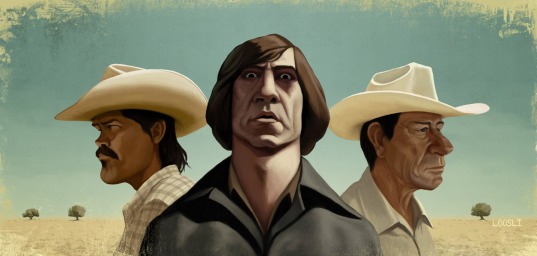No Country for Old Men (2007)
1. Analysis of the Book. No Country for Old Men is a novel written by Cormac McCarthy and published in 2005. The book is, for the most part, set in West Texas (aside from a brief stint across the river from Del Rio [Ciudad Acuña, Mexico]), and follows the events that transpire after Llewelyn Moss, the protagonist, discovers two million dollars in the remnants of a border drug conflict. Like many of McCarthy’s books, there is a large amount of consideration given to the concept of randomness versus fate. The books antagonist, Chigurh, relates a great deal of this conflict in hi dialogues.
2. Analysis of the Film. The film is an adaptation of Cormac McCarthy’s book of the same name. It was released in 2007. Unlike, most films it does not have any kind of significant soundtrack, and therefore does not manipulate the emotional tone of the film through use of music. It is left to the viewers own interpretation. The adaptation was done by the Coen brothers, and incorporates various elements of their own dark humor. It is considered by most to be a very faithful retelling of the novel.
3. Analysis of the Adaptation. The adaptation of the film remains true to the book. In fact, it is undoubtedly the most faithful adaptation of any of the films examined so far. Yet, there are significant differences. For the sake of brevity I will not list all the differences, but please see the following for a more detailed description: http://www.avclub.com/articles/book-vs-film-no-country-for-old-men,10236. (For example, the scene between Chigurh and Carla Jean is quite different, and the details of the kid who removes Chigurh’s gun from the car is omitted.) Still, the film version goes to great length to recreate the setting detailed in the book. On a personal note, as a former resident of Alpine, Texas (the same town as one of the victims), I thought they did a pretty good job of filming the setting.
4. Online Research of the Film. The three online sources I found in relation to No Country for Old Men include:
http://philzine.wordpress.com/2007/11/30/no-country-for-old-men-a-critical-response This site has a fairly extensive analysis of the film. Phil, the blog owner, concentrates on the quote by Ed Tom’s uncle regarding vanity. It is one of the most important quotes in the film. I do not necessarily agree entirely with his conclusion, but I think it is better than most.
http://www.avclub.com/articles/book-vs-film-no-country-for-old-men,10236 provides an excellent breakdown of differences between the book and the film. Specifically, it outlines scenes not included in the film from the book.
http://meetinthelobby.com/debate-no-country-for-old-men-ending.html This is not the usual kind of URL I would post, but it has an interesting debate over the ending of the movie with some very interesting comments.
5. Critical Analysis.
The character of Anton Chigurh in No Country for Old Men has been cited as an example of nihilism, a philosophy that holds life has no meaning and that there is no such thing as objective truth. Does this label fit Chigurh (does he have a value system?), or is he just a psycho-killer?
Anton Chigurh is not a nihilist. A nihilist wants to destroy everything, but Chigurh does not want to destroy everything. He kills all those who cross his path, but his destruction is tempered by a kind of moral code that allows the opportunity of randomness or free choice to remove the individual from certain death. Chigurh is something other than a nihilist. Anton Chigurh is more a force of nature. He is more than human in No Country for Old Men. He is a symbol, a force. He is more machine than man. Throughout the film he is seemingly devoid of emotion, compassion, and sympathy. In fact, he operates on a mechanical logic where random chance and fate play integral parts in his actions. Take, for example, the two times in the film where he gives his victims a chance to choose heads or tails over the flip of a coin. Additionally, his victims often remark, “you don’t have to do this,” but of course he does. He is not capable of choice. He is not real, but, rather, an exaggerated hyperbole.

Andrew- I would have to agree that Chigurh is meant more as a symbol than an individual. In my post I suggested that perhaps he is (or at least sees himself) as an agent of fate and does not feel he can rightfully shoulder the responsibility of his actions, placing the blame instead on fate (by way of his coin). Nihilism is generally characterized by a complete rejection of commonly held beliefs or social norms and as we can see, Chigurh still adheres to his own moral code. This code may seem random but note that he does not kill indiscriminately which might suggest that his principles are certainly non-traditional and harsh but they’re principles nonetheless.
Good analysis. OK online research links, but one of them was an assigned reading so shouldn’t show up in your online research. Your argument that Chigurh is not a nihilist was convincing. He does have a moral code. But maybe it would be going too far to see him as a kind of samurai (still it’s an interesting comparison). 10/10. JB.